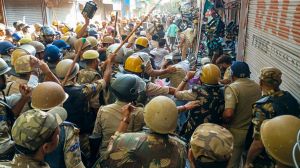Obama limits US use of nuclear arms
Obama unveiled a new policy restricting US use of nuclear weapons but sent a stern message to nuclear-defiant Iran and North Korea that they remain potential targets.
President Barack Obama unveiled a new policy on Tuesday restricting US use of nuclear weapons but sent a stern message to nuclear-defiant Iran and North Korea that they remain potential targets.
Kicking off a hectic week for Obama’s nuclear agenda,his administration rolled out a strategy review that renounced US development of new atomic weapons and could herald further cuts in America’s stockpile.
The announcement,calling for reduced US reliance on its nuclear deterrent,could build momentum before Obama signs a landmark arms control treaty with Russia in Prague on Thursday and hosts a nuclear security summit in Washington next week.
But Obama’s new nuclear doctrine drew criticism from conservatives who said his approach could compromise US national security and disappointed some liberals who wanted the president to go further on arms control.
The long-delayed nuclear policy statement could also deepen US strains with China by expressing concern about Beijing’s military buildup,including growing nuclear might.
“We are taking specific and concrete steps to reduce the role of nuclear weapons while preserving our military superiority,deterring aggression and safeguarding the security of the American people,” Obama said in remarks issued by the White House.
The United States for the first time is forswearing use of atomic weapons against non-nuclear countries,a break with a Bush-era threat of nuclear retaliation in the event of a biological or chemical attack.
But this comes with a major condition. Those countries would be spared a US nuclear response only if they are in compliance with the Nuclear Non-Proliferation Treaty.
Iran and North Korea would thus not be protected.
“If there is a message for Iran and North Korea here,it is … if you’re not going to play by the rules,if you’re going to be a proliferator,then all options are on the table in terms of how we deal with you,” US Defence Secretary Robert Gates told reporters.
THREAT OF NUCLEAR ATTACK
The Nuclear Posture Review,as the policy document is known,stated: “The threat of global nuclear war has become remote,but the risk of nuclear attack has increased.”
Republicans,who have sought to brand Obama as soft on defense,quickly criticized the new nuclear policy.
“The US has had a long-standing policy,embraced by administrations of both parties,of retaining all options to respond to an attack,” Republican Senators John McCain and Jon Kyl said in a joint statement. “The NPR released today confuses this long-standing policy.”
The NPR is required by Congress from every US administration but Obama set expectations high after he vowed to end “Cold War thinking” and won the Nobel Peace Prize in part for his vision of a nuclear-free world.
Seeking to set an example,the Obama administration said the United States would consider use of nuclear weapons only in “extreme circumstances” and committed to not developing any new nuclear warheads. But there were plenty of caveats.
“It doesn’t measure up to (Obama’s) vision of a nuclear free world,” said Kevin Martin at anti-nuclear weapons group Peace Action.
The administration pledged to pursue further arms control with Russia beyond the new START pact Obama and Russian President Dmitry Medvedev will sign this week in Prague,in which they promise to slash nuclear arsenals by a third.
“The United States will pursue high-level,bilateral dialogues on strategic stability with both Russia and China which are aimed at fostering more stable,resilient,and transparent strategic relationships,” it said.
But the Obama administration said a lack of transparency surrounding China’s nuclear programs was cause for concern over Beijing’s strategic intentions.
OBAMA TO MEET HU
The White House said Obama and Chinese President Hu Jintao would meet on the sidelines of the 47-country nuclear summit in Washington on April 12-13. That would also be a chance to ease tensions over other issues,including a dispute over the valuation of China’s currency.
“China’s nuclear arsenal remains much smaller than the arsenals of Russia and the United States,” the document said.
“But the lack of transparency surrounding its nuclear programs — their pace and scope,as well as the strategy and doctrine that guides them — raises questions about China’s future strategic intentions.”
Obama now faces the challenge of lending credibility to his arms control push while not alarming allies under the US defense umbrella or limiting room to maneuver in dealing with emerging nuclear threats from Iran and North Korea.
The review is a test of Obama’s effort to make controlling nuclear arms worldwide a signature foreign policy initiative. It is also important because it will affect defense budgets and weapons deployment and retirement for years to come.







- 01
- 02
- 03
- 04
- 05
























